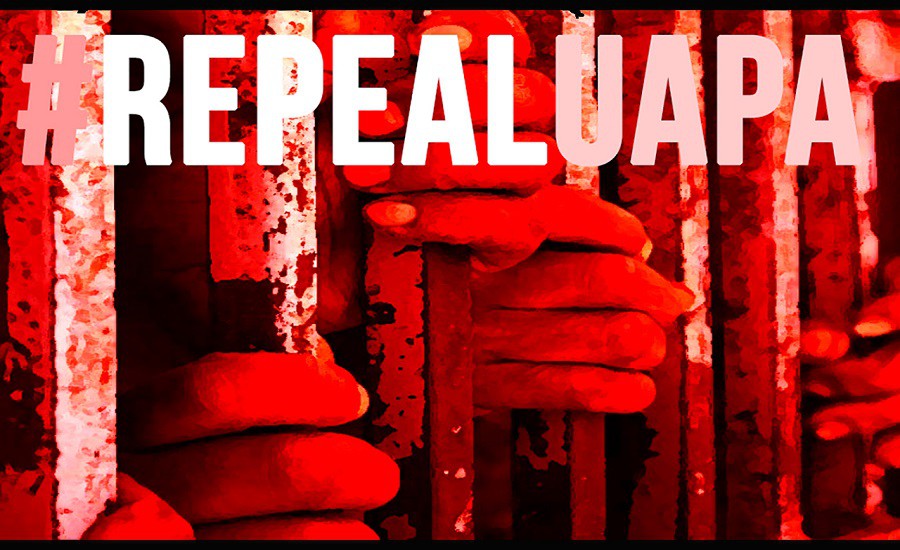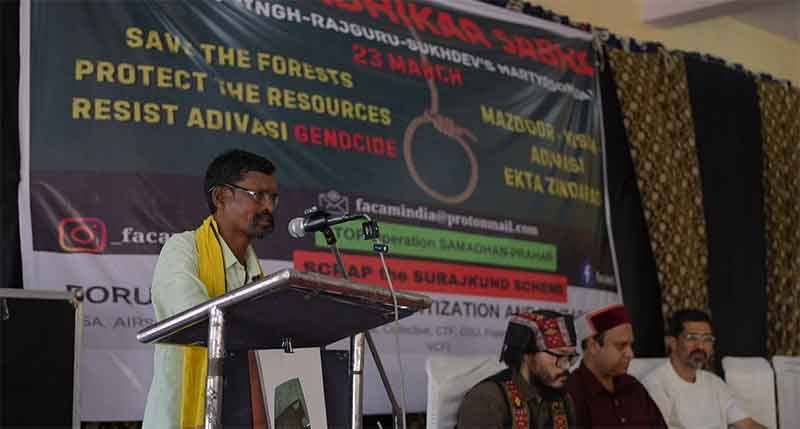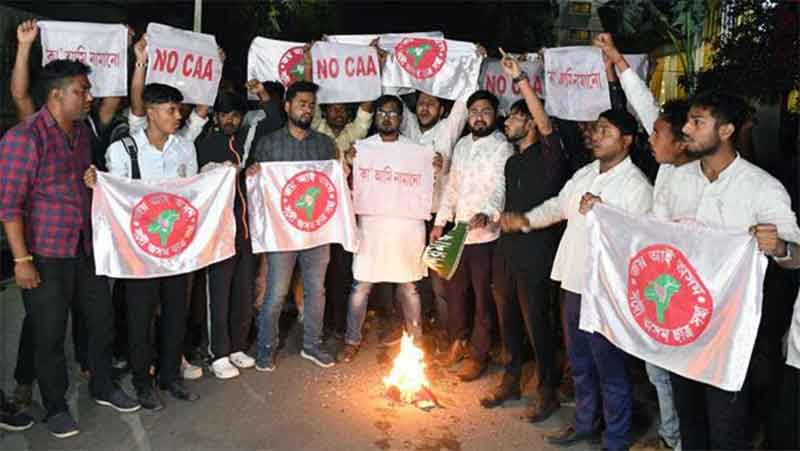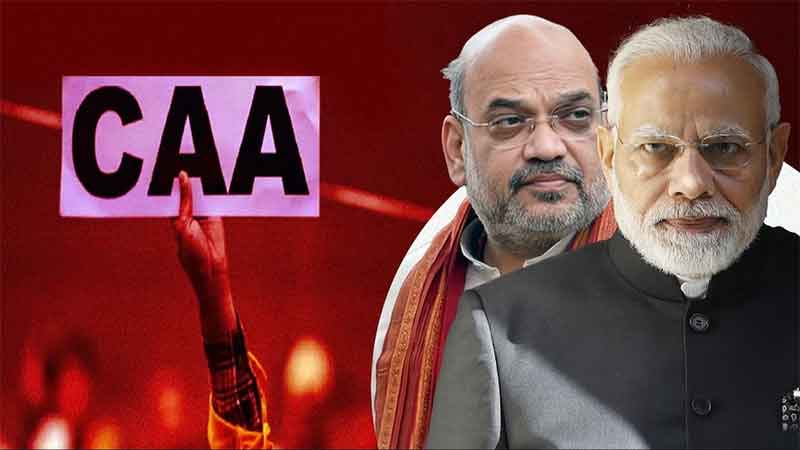Co-Written by Saumya and Harsh Kumar

Peasant leader and RTI Activist Akhil Gogoi from Assam booked under the amended UAPA act 2019 tested positive for COVID-19 in jail. He has been allegedly booked for his role in protests against the Citizenship Amendment Act last year under the sections 120B(punishment of criminal conspiracy), 153A(unlawful association) and 153B(imputations, assertion prejudicial to national-integration), and section 18/39(punishment for conspiracy) of the Unlawful Activities Prevention Act.
The unlawful activities prevention amendment bill 2019 seeks to amend unlawful activities prevention act of 1967, a contentious bill is controversial since its inception. The recent amendment in 2019 adds two noteworthy elements to the law which subvert the edifice of Indian federal system and Human rights. The first one deals with broadening the definition of “terrorist” to include individuals under section 35 and 36 of chapter VI of the act. Second, it allows the NIA liberty to take control over the cases which would otherwise fall in ambit of state authorities. It gives central government an ascendancy over state machineries. This law contradicts the fundamental freedom to associate and assemble by giving the government liberty to ban organisation merely on their “belief”. Now on the same grounds the government can declare an individual a terrorist. Indian democracy provides a number of examples to show the draconian nature of this act.
The right of dissent is an intrinsic part of fundamental right to free speech and expression and therefore it cannot be denied in any circumstances except provisions mentioned under article 19(2). UAPA like other anti-terror laws in India is based on carte blanche of the government and criminalises two types of activities – i) unlawful activity (ii) terrorist act. After the 2004 amendment, definition of unlawful activity in section 2(o) of act become so wider that a bare reading of it shows there is no need of physical violence to impose this act. It can penalise any view, belief or person which is menacing to the people in power. It can punish even unintentional and unintended disaffection also. The other activity which gets punishable is terrorist activity.
The definition of terrorist activity in section 15 goes far beyond from the general conception about it. Even the acts like death, injuries to a person, damage to a property, any act to compel the government or any person to do or abstain from doing anything falls under the ambit of this act. In result this law has been used blatantly to supress dissent voices against the government.
NCRB data suggests that the number of cases registered under UAPA has increased significantly in recent years. 922 cases were registered in 2016 and it has increases to 1182 in the 2018. After the Anti-CAA protest the number is increasing with the arrests of students who participated in the CAA and NRC protest. It is very much clear that arrested students like Meeran Haider, Natasha Narwal, Umar Khalid and Safoora Zargar has protested against NPR, NRC and CAA in accordance with their fundamental rights as conferred by the constitutions of India . Hence the invocation of UAPA is inherently illegal and questionable.
Safoora Zargar, an M.Phil Student from Jamia arrested on 10th of April. She was arrested for allegedly leading the Anti-CAA protest and her role in northeast Delhi riots. At the time of arrest she was 3 months pregnant but the court denies her bail on the basis that there is prima facie evidence to show there was conspiracy. 2008 amendment in this act empowers the court to deny bail of the accused person if the court believes that the accusation against him/her is prima facie true. But the presumption of guilt or innocence while giving bail is wrong on the part of the judges.
The sole purpose of bail hearing is to determine whether the accused will run away or commit any offence. The basis for granting bail to the people charged with terror laws was also reversed in Australia in the anti-terrorism act 2004 which was later used in UN’s rapporteur on the promotion and protection of human rights while dealing with terrorism and provided reasons for the denial of bail applications such as suppression of evidence or the commission of further evidence. Safoora Zargar was sent to Tihar jail in this pandemic for two months after which she gets bail on humanitarian ground considering her pregnancy state. Students like Meeran Haider, Umar Khalid, Sharjeel Imam who participated in Anti-CAA protest now facing UAPA charges and facing judicial custody.
After the 2008 amendment act period of pre-charge detention is extended to 180 days, if after 90 days public prosecutor shows that investigation has progressed and needed more time. Therefore UAPA is not a bill meant for conviction rather it is used for detaining accused persons. Akhil Gogoi a peasant leader in Assam also been booked under this law and till date has completed 212 days in jail. Now Gogoi with his 55 inmates in jail tested positive for the covid-19. During this pandemic many prisoners without any serious charges were released from jails across the world. In such situation keeping Gogoi and his associates inside the jail is not reasonable. Masrat Zahra a freelance photojournalist in Kashmir also the winner of Anja Niedringhaus Courage in Photojournalism award 2020 by International Women’s Media Foundation charged with UAPA for “uploading anti-national posts with the intention to promote offence against public tranquillity”. While it was not specified that which of her photo attracted the charges.
UAPA act like its previous anti-terror laws has a very low conviction rate. As per NCRB data 22 out of 33 cases under UAPA ended in acquittal of the accused compared to 18 percent under the special and local laws. TADA which was in force for 8 years repealed due to it’s low conviction rate of 1.11 percent. But UAPA is one step ahead of its previous Anti-terror laws due to the lack of sunset clause. 2008 amendment made anti-terror laws an ordinary criminal law therefore the current amendment goes beyond its previous anti-terror laws and results in a situation where the provision of this act cannot be reviewed unless the government wants to do so.
UK terrorism act 2000 provides provision for the periodic review of the anti-terror legislation. Home secretary must appoint a person to review the legislation every year. Canada anti-terrorism act also provides for the constitution of a parliamentary committee for the review within three years after the enactment of legislation. UAPA provides very limited judicial review of its proceedings including bail and precharge detention and therefore periodic review of this legislation is very important.
The surge in cases under this act is maximum in 5 states- Manipur(35%), Jammu & Kashmir(17%), Assam(14%), Uttar Pradesh(12%), Bihar(5%). Since last six years all these five states are either ruled by BJP or BJP coalition government. Designating someone as a terrorist without trial is dangerous and there are numerous examples to show that how this act has been used to harass individual socially.
In case of Safoora Zargar it is evident that how social media gets flooded with her pregnancy thing and lots of slangs used for her. UNHRC general comment no. 32 also set out principle of presumption of innocence but media trial in these cases tags any person as a terrorist or anti-national without a fair trial. This act has been used to criminalise the fundamental freedom to associate and assemble enshrined in Article 19 of the constitution and also freedom of protesting which comes under freedom of speech and expression, by simply banning the Organisations and booking the individual that questions the status quo of the government. The nature of this act is that it requires no reason on the part of government to ban or book any organisation or individual under this act. Simple opinion of the government is enough to inflict this stringent law on anyone. Section 3 of this act requires the prior approval of a tribunal to impose the ban but section 35 of this act do not requires any such approval. The recent amendment which confers power on government to designate individual a terrorist will be dangerous under section 35 of the act.
Security of a country against terrorism is necessary but this should not be done by undermining democratic institutions or the rule of law. To bring such hard laws without proper checks and balances empowers the government to work on its whims and fancies and also to meet its personal gains. This can be used as a tool for political witch hunting wherein selective organisations and individuals who demanded the status quo of government or questions the legitimacy of the government will be outlawed. Lower conviction rate of this act suggests that we do not need draconian laws like UAPA but we need fair judicial process and professional investigation.
Saumya and Harsh Kumar are Students of B.A.LLB, National University of study and research in law, Ranchi
SIGN UP FOR COUNTERCURRENTS DAILY NEWSLETTER















































